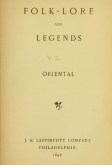The Two Cats
Arabic Folktale
In former days there was an old woman, who lived in a hut more confined than the minds of the ignorant, and more dark than the tombs of misers. Her companion was a cat, from the mirror of whose imagination the appearance of bread had never been reflected, nor had she from friends or strangers ever heard its name. It was enough that she now and then scented a mouse, or observed the print of its feet on the floor; when, blessed by favouring stars or benignant fortune, one fell into her claws—
This feast would last for a week or more; and while enjoying it she was wont to exclaim—
But as the dwelling of the old woman was in general the mansion of famine to this cat, she was always complaining, and forming extravagant and fanciful schemes. One day, when reduced to extreme weakness, she, with much exertion, reached the top of the hut; when there she observed a cat stalking on the wall of a neighbour’s house, which, like a fierce tiger, advanced with measured steps, and was so loaded with flesh that she could hardly raise her feet. The old woman’s friend was amazed to see one of her own species so fat and sleek, and broke out into the following exclamation:—
The other answered, “I am the Sultan’s crumb-eater. Each morning, when they spread the convivial table, I attend at the palace, and there exhibit my address and courage. From among the rich meats and wheat-cakes I cull a few choice morsels; I then retire and pass my time till next day in delightful indolence.”
The old dame’s cat requested to know what rich meat was, and what taste wheat-cakes had? “As for me,” she added, in a melancholy tone, “during my life I have neither eaten nor seen anything but the old woman’s gruel and the flesh of mice.” The other, smiling, said, “This accounts for the difficulty I find in distinguishing you from a spider. Your shape and stature is such as must make the whole generation of cats blush; and we must ever feel ashamed while you carry so miserable an appearance abroad.
Were you to see the Sultan’s palace, and to smell his delicious viands, most undoubtedly those withered bones would be restored; you would receive new life; you would come from behind the curtain of invisibility into the plane of observation—
The old woman’s cat addressed the other in the most supplicating manner: “O my sister!” she exclaimed, “have I not the sacred claims of a neighbour upon you? are we not linked in the ties of kindred? What prevents your giving a proof of friendship, by taking me with you when next you visit the palace? Perhaps from your favour plenty may flow to me, and from your patronage I may attain dignity and honour.
The heart of the Sultan’s crumb-eater was melted by this pathetic address; she promised her new friend should accompany her on the next visit to the palace. The latter, overjoyed, went down immediately from the terrace, and communicated every particular to the old woman, who addressed her with the following counsel:—
“Be not deceived, my dearest friend, with the worldly language you have listened to; abandon not your corner of content, for the cup of the covetous is only to be filled by the dust of the grave, and the eye of cupidity and hope can only be closed by the needle of mortality and the thread of fate.
But the expected feast had taken such possession of poor puss’s imagination, that the medicinal counsel of the old woman was thrown away.
To conclude: next day, accompanied by her companion, the half-starved cat hobbled to the Sultan’s palace. Before this unfortunate wretch came, as it is decreed that the covetous shall be disappointed, an extraordinary event had occurred, and, owing to her evil destiny, the water of disappointment was poured on the flame of her immature ambition. The case was this: a whole legion of cats had the day before surrounded the feast, and made so much noise that they disturbed the guests; and in consequence the Sultan had ordered that some archers armed with bows from Tartary should, on this day, be concealed, and that whatever cat advanced into the field of valour, covered with the shield of audacity, should, on eating the first morsel, be overtaken with their arrows. The old dame’s puss was not aware of this order. The moment the flavour of the viands reached her, she flew like an eagle to the place of her prey.
Scarcely had the weight of a mouthful been placed in the scale to balance her hunger, when a heart-dividing arrow pierced her breast.
Folk-Lore and Legends: Oriental

Notes: Contains 13 folktales from the Orient.
Author: Charles John Tibbitts
Published: 1889
Publisher: W. W. Gibbings, London